- Home
- Rudy Rucker
Surfing the Gnarl
Surfing the Gnarl Read online
RUDY RUCKER
Two-time winner of the
Philip K. Dick Award
“Rucker is a mathematician bewitched by the absurdity of the universe, and a writer possessed of a brilliantly witty pen.”
—Publishers Weekly
“Rudy Rucker’s sense of fun is rare indeed. He has been compared to Lewis Carroll, and the comparison is not presumptuous. Like Carroll, Rucker is a mathematician who not only enjoys paradoxes, but can propagate that enjoyment as pure lunatic humor.”
—Washington Post
“Reading a Rudy Rucker book is like finding Poe, Kerouac, Lewis Carroll and Philip K. Dick parked in your driveway in a topless ‘57 Caddy … and telling you they’re taking you for a RIDE. The funniest science fiction author around.”
—Sci-Fi Universe
“Rudy Rucker is an oddity and a treasure.”
—Wired
“Rucker’s sensibility is a combination of gonzo humor, fictionalized autobiography in the Kerouacian mode (what Rucker calls ‘transrealism’), and the sheer, bugs-in-your-teeth thrill of scientific extrapolation taken to blitz-punk extremes.”
—Salon.com
“Rucker’s writing is great like the Ramones are great: a genre stripped to its essence, attitude up the wazoo…. No one does the cyber version of beatnik glory quite like Rucker.”
—NY Review of Science Fiction
PM PRESS OUTSPOKEN AUTHORS SERIES
1. The Left Left Behind
Terry Bisson
2. The Lucky Strike
Kim Stanley Robinson
3. The Underbelly
Gary Phillips
4. Mammoths of the Great Plains
Eleanor Arnason
5. Modem Times2.0
Michael Moorcock
6. The Wild Girls
Ursula Le Guin
7. Surfing the Gnarl
Rudy Rucker
8. The Great Big Beautiful Tomorrow
Cory Doctorow
9. Report from Planet Midnight
Nalo Hopkinson
Rudy Rucker © 2012
This edition © 2012 PM Press
“The Men in the Back Room at the Country Club” appeared in Infinite Matrix, December 2005, and in Mad Professor (Thunder’s Mouth Press, 2007). “Rapture in Space” appeared in Semiotext[e] SF (Autonomedia, 1989), and in Gnarl! (Four Walls Eight Windows, 2000). Some passages from “Surfing the Gnarl” appeared in The Lifebox, the Seashell, and the Soul (Basic Books, 2005), Mad Professor (Thunder’s Mouth Press, 2007), and Nested Scrolls (PS Publishing and Tor Books, 2011).
Series Editor: Terry Bisson
ISBN: 978-1-60486-309-3
LCCN: 2011927979
PM Press
P. O. Box 23912
Oakland, CA 94623
PMPress.org
Printed in the USA on recycled paper, by the Employee Owners of Thomson-Shore in Dexter, Michigan
www.thomsonshore.com
Outsides: John Yates/Stealworks.com
Insides: Josh MacPhee/Justseeds.org
CONTENTS
“The Men in the Back Room at the Country Club”
“Surfing the Gnarl”
“Rapture in Space”
“Load on the Miracles and Keep a Straight Face” Outspoken Interview with Rudy Rucker
Bibliography
About the Author
THE MEN IN THE BACK ROOM AT THE COUNTRY CLUB
“Yo, JACK,” SAID TONEL as they lugged two golf bags apiece toward the men’s locker room. It was sunset, the end of a long Saturday’s caddying, Jack’s last day of work this summer.
“I didn’t get a chance to tell you,” continued Tonel, shouldering open the door. “About who I saw sweatin’ in Ragland’s backyard this morning.” It was fresh and cool in the locker room. A nice break from the heavy, thick August air.
“In Ragland’s yard?” said Jack Vaughan, setting down the bags and wiping his brow. “I don’t know. His ninety-year-old mother?” Jack suspected a joke. Ragland was the master of the locker room, ensconced behind his counter. Tidily cleaned shoes and piles of fresh white towels sat on the white-painted shelves around him. Although the bare-skulled Ragland’s eyes were half-closed, it was likely that he was listening.
“It was the five mibracc,” said Tonel. “Doin’ Ragland’s yard work. Isn’t that right, Ragland? What’s the dealio? How you get to slave-driving them Republicans? I need to know.” Tonel lived right next door to Ragland. The two weren’t particularly fond of each other.
“Don’t be mouthin’ on my business, yellow dog,” said Ragland. Though he cleaned the shoes of popinjays, he insisted on his dignity.
A burst of talk echoed from the little back room beyond Ragland’s station. Just like every other morning or afternoon, the mibracc—the caddies’ nickname for “men in the back room at the country club”—were in there, safe from women, out of the daylight, playing cards and drinking the bourbon they stored in their lockers.
“Those bagworts do chores?” said Jack. “No way, Tonel.”
“I seen it,” insisted Tonel. “Mr. Atlee was draggin’ a plow with Mr. Early steerin’ it. Mr. Gupta was down on his knees pullin’ up weeds, and Mr. Inkle and Mr. Cuthbert was carryin’ trash out to the alley. Ole Ragland sittin’ on the back porch with his shotgun across his knees. Did your Meemaw put conjure on them, Ragland?”
“You want me to snapify your ass?” said Ragland. Though gray and worn, Ragland was, in his own way, an imposing man.
Tonel made a series of mystic passes, hoodoo signs, and rap gestures in Ragland’s direction.
“I’ll ask the men myself,” said Jack, caught up by Tonel’s rebellious spirit.
The two boys stepped into the back room, a plain space with a tile floor and shiny green paint on the win-dowless concrete walls. The five old men sat in battered wooden captain’s chairs around a table from the club’s lounge. Oily Mr. Atlee was dealing out cards to spindly, white-haired Mr. Early, to bald-as-a-doorknob Mr. Inkle, to Mr. Cuthbert with his alarming false teeth, and to Mr. Gupta, the only nonwhite member of the Killeville Country Club.
“Hi, guys,” said Jack.
There was no response. The mibracc studied their cards, sipping at their glasses of bourbon and water, their every little gesture saying, “Leave us alone.” Mr. Inkle stubbed out a cigarette and lit a fresh one.
“Listen up,” said Tonel in a louder tone. “I gotta axe you gentlemen somethin’. Was you bustin’ sod for Ragland today? My friend here don’t believe me.”
Still no answer. The mibracc were so fully withdrawn into their clubby little thing that you could just as well try talking to your TV. Or to five spiteful children.
“Scoop,” grunted Mr. Cuthbert, standing up with his glass in hand. Mr. Gupta handed him his empty glass as well. With the slightest grunt of nonrecognition, Mr. Cuthbert sidled past Tonel and Jack, moving a little oddly, as if his knees were double-jointed. His oversized plastic teeth glinted in the fluorescent light. Mr. Cuthbert pressed his thumb to his locker’s pad, opened the door, and dipped the two glasses down into his golf bag. Jack could smell the bourbon, a holiday smell.
The mibracc’s golf bags held no clubs. They were lined with glass, with tall golf bag—sized glass beakers, or carboys. Big glass jars holding gallons of premium bourbon. It was a new gimmick, strictly hush-hush; nobody but Ragland and the caddies knew. Mr. Atlee, a former druggist, had obtained the carboys, and Mr. Early, a former distiller’s rep, had arranged for a man to come one night with an oak cask on a dolly to fill the bags. The mi-bracc were loving it.
Mr. Cuthbert shuffled back past Tonel toward the card table, the liquid swirling in his two glasses. The boy fell into step behind the old man, draping his hand onto the mibracc�
��s shoulder. Mr. Cuthbert paid him no mind. Jack joined the procession, putting his hand on Tonel’s shoulder and trucking along in his friend’s wake. Tonel was humming the chorus of the new video by Ruggy Qaeda, the part with the zombies machine-gunning the yoga class.
After Mr. Cuthbert dropped into his chair and picked up his cards, Jack and Tonel circled the room two, three, four times, with Tonel finally bursting into song. Never did the mibracc give them a second glance. Odd as it seemed, the liquid in the glasses still hadn’t settled down; it was moving around as if someone were stirring it.
Around then Ragland came out from behind his counter, wielding a wet, rolled-up towel. Silly as it sounded, being snapped by the old locker room attendant was a serious threat. Ragland was the ascended kung-fu master of the towel snap. He could put a bruise on your neck that would last six weeks. Laughing and whooping, Tonel and Jack ran outside.
A white face peered out of the window in the clubhouse’s terrace door. The door swung open and a plain, slightly lumpish girl in a white apron appeared. Gretchen Karst.
“I’m pregnant, Jack,” said Gretchen, her sarcastic, pimply face unreadable. “Marry me tonight. Take me off to college with you tomorrow.”
“How do you know it’s me?” protested Jack. “I’m not the only—I mean even Tonel said he—”
“Tonel is a horn worm. All I gave him was a hand job. And it didn’t take very long. Jack, there’s a justice of the peace out on Route 501. Ronnie Blevins. He works at Rash Decisions Tattoo. I found him online. Since it’s Saturday, they’re open till midnight. I’m off work right now, you know. I started early today.”
“Stop it, Gretchen. You and me—it’s not—”
“I’m serious,” said Gretchen, although there was in fact a good chance that she was scamming him. Gretchen had a twisted mind. “You’re my best chance, Jack,” she continued. “Marry me and take me with you. I’m smart. I like sex. And I’m carrying your son.”
“Uh—”
Just then someone shouted for Gretchen from the corner of the clubhouse building. It was Gretchen’s dad, standing at the edge of the parking lot. He’d trimmed his flattop to high-tolerance precision and he was wearing his shiny silver jogging suit. All set for the weekly meeting at the Day Six Synod’s tabernacle.
Gretchen could talk about the Day Six Synod for hours. It was a tiny splinter religion based on the revelation that Armageddon, the last battle, was coming one-seventh sooner than the Seventh Day Adventists had thought. We were already in the end times, in fact, with the last act about to be ushered in by manifestations of Shekinah Glory, this being the special supernatural energy that God—and Satan—use to manifest themselves. The pillar of fire that led the Israelites to the promised land, the burning bush that spake to Moses—these had been Shekinah Glory. The Day Six Synod taught that our Armageddon’s Shekinah Glory would take the form of evil UFOs pitted against winged angels.
Karl Karst’s jogging suit was silver to remind him of the Shekinah Glory. The Day Six Synod meetings featured impressively high-end computer graphics representing the Glory in its good and evil forms. Though Mr. Karst was but a county school-bus mechanic, some of the core founders of the Day Six Synod were crackpot computer hackers.
“Shake a leg or we’ll be late,” shouted Mr. Karst. “Hi, Jack and Tonel. Wait till you see who I’ve got with me, Gretchen!”
“I’ll deal with you later,” said Gretchen to Jack with a slight smile. Surely she’d only been teasing him about the pregnancy. She made the telephone gesture with her thumb and pinky. “We’ll coordinate.”
“Okay,” said Jack, walking with her toward her father. “I’m visualizing hole six.” Hole six of the KCC golf course was the popular place for the club’s young workers to party. It was well away from the road, on a hillock surrounded on three sides by kudzu-choked woods.
Right now, Jack figured to eat dinner at Tonel’s. He didn’t want to go to his own house at all. Because this morning on the way to the Killeville Country Club, he’d doubled back home, having forgotten his sunglasses, and through the kitchen window he’d seen his mom kissing the Reverend Doug Langhorne.
It wasn’t all that surprising that Doug Langhorne would make a play for the tidy, crisp widow Jessie Vaughan, she of the cute figure, tailored suits, and bright lipstick. Jessie was the secretary for the shabby-genteel St. Anselm’s Episcopal Church on a once-grand boulevard in downtown Killeville, right around the corner from the black neighborhood where Tonel lived, not that any black people came to St. Anselm’s. Jessie’s salary was so meager that Reverend Langhorne let Jessie and Jack live with him in the rectory, a timeworn Victorian manse right next to the church.
Doug Langhorne’s wife and children shared the rectory as well. Lenore Langhorne was a kind, timid soul, nearsighted, overweight and ineffectual, a not-so-secret drinker of cooking sherry, and the mother of four demanding unattractive children dubbed with eminent Killeville surnames. Banks, Price, Sydnor, and Rainey Langhorne.
Setting down his bicycle and stepping up onto his home’s porch this morning, Jack had seen his mother in a lip lock with Doug Langhorne. And then Mom had seen Jack seeing her. And then, to make it truly stomach-churning, Jack had seen Lenore and her children in the shadows of the dining room, witnessing the kiss as well. The couple broke their clinch; Jack walked in and took his sunglasses; Lenore let out a convulsive sob; Doug cleared his throat and said, “We have to talk.”
“Daddy kissed Jack’s mommy!” cried Banks Langhorne, a fat little girl with a low forehead. Her brother Rainey and her sisters Price and Sydnor took up the cry. “Daddy’s gonna get it, Daddy’s gonna get it, Daddy’s gonna get it …” There was something strange about the children’s ears; they were pointed at the tips, like the ears of devils or of pigs. The children joined hands in a circle around Doug and Jessie and began dancing a spooky Ring-Around-the-Rosie. Lenore was trying to talk through her racking sobs. Doug was bumblingly trying to smooth things over. Mom was looking around the room with an expression of distaste, as if wondering how she’d ended up here. On the breakfast table, the juice in the children’s glasses was unaccountably swirling, as if there were a tiny whirlpool in each. Jack rushed outside, jumped on his bike, and rode to work, leaving the children’s chanting voices behind.
Jack had pretty much avoided thinking about it all day, and what should he think anyway? It was Jessie’s business who she kissed. And surely he’d only imagined the pointed ears on those dreadful piggy children. But what about Lenore? Although Lenore was like a dusty stuffed plush thing that made you sneeze, she was nice. She’d always been good to Jack. Her sob was maybe the saddest thing he’d ever heard. Grainy, desperate, hopeless, deep. What did the kiss mean for Mom’s future as the church secretary? What did it bode for Doug Langhorne’s position as rector? What a mess.
Jack’s plan was to stay out most of the night or all of the night with his friends, grab his suitcase in the morning, and get the 8:37 a.m. bus to Virginia Polytechnic Institute in Blacksburg. And there he’d begin his real life. Let Mom and Lenore and Doug work things out in pawky, filthy Killeville. Jack’s bag was packed. He was ready to set off for the great outer world!
With these thoughts running in his head, he followed Gretchen to the parking lot, Tonel tagging along. Mr. Karst was mounted in his battered secondhand Ford SUV. Sitting next to him was an unkempt, overweight, luminously white guy smoking a filter cigarette.
“Albert Chesney!” exclaimed Gretchen.
“Him!” said Jack. The thirty-year-old Albert Chesney was a Day Six Synodite and a convicted computer criminal. He’d just gotten parole; his release had been a topic in the Killeville Daily News for several days. Three years ago, Chesney had brought down the entire Internet for a week with his infamous
o the Day Six Synod.
“Don’t ride with him, Gretchen,” said Jack, suddenly visualizing a defenseless big-eyed fetus within Gretchen’s slightly curved belly. He seemed to recall that Chesney had always been interested in Gretchen. Chesney was single, with no relatives.
“Oh, now you’re all protective?” said Gretchen. “Don’t worry. I can handle myself. Welcome back, Albert. Are you fully rehabilitated?”
“I’ve hoed a long, lonely row,” sighed Albert Chesney. His voice was husky; his head was big and crooked like a jack-o’-lantern. “The Pharisees say I’m not allowed to live in a house with computers. What with the Synod having the tabernacle on my farm, I’m exiled to a humble abode on Route 501. Leastways it won’t be but one night. The last battle’s comin’ tomorrow morning, hallelujah and pass it on. Armageddon. Angels and devils fighting for the fate of our world. Drive your chariot onward, Karl. I need a taste of my sweet country roads. And then I’ll prophesy to the fellowship about the Shekinah Glory.”
“You bet, Albert,” said Mr. Karst. “Don’t he look good, Gretchen?” Mr. Karst liked Chesney because he’d let Day Six use his farmhouse for their tabernacle the whole time he’d been in jail. Swaying and backfiring, the rusty SUV lumbered off.
“Do he say the world ends tomorrow?” asked Tonel.
“Don’t worry,” said Jack. “They always say that. Back in May, Mr. Karst tried to stop Gretchen from buying a prom dress because the last battle was due to come before our graduation.”
Turning back to the clubhouse, Tonel and Jack encountered muscular Danny Dank, who’d just finished setting up the giant propane-fueled two-whole-hog barbeque wagon that the club used for their galas. Tomorrow was the day of the club’s annual Killeville Barbeque Breakfast Golf Classic, starting near dawn.
Danny tightened down the cover of the quilted chrome wagon and unwrapped a stick of marijuana gum, the pricey brand called Winnipeg Wheelchair. Grinning and chewing, he gestured for the two caddies to sit down with him on a low wall facing the eighteenth green and the last glow of the sunset.

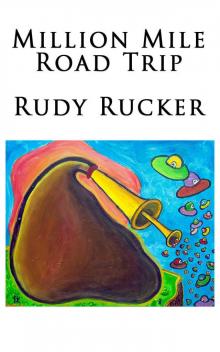 Million Mile Road Trip
Million Mile Road Trip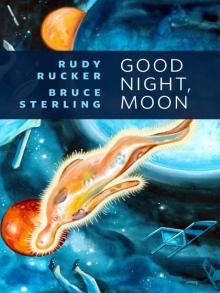 Good Night, Moon
Good Night, Moon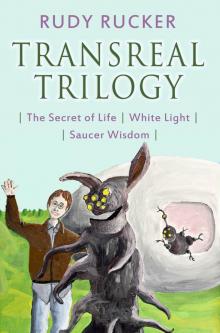 Transreal Trilogy: Secret of Life, White Light, Saucer Wisdom
Transreal Trilogy: Secret of Life, White Light, Saucer Wisdom Complete Stories
Complete Stories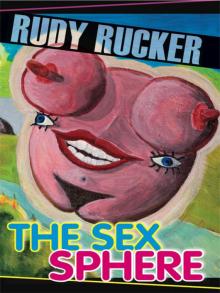 The Sex Sphere
The Sex Sphere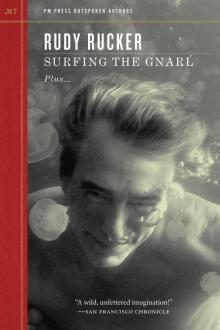 Surfing the Gnarl
Surfing the Gnarl Software
Software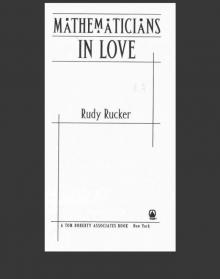 Mathematicians in Love
Mathematicians in Love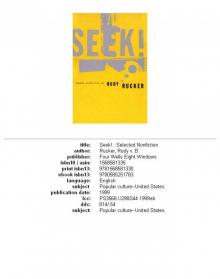 Seek!: Selected Nonfiction
Seek!: Selected Nonfiction The Secret of Life
The Secret of Life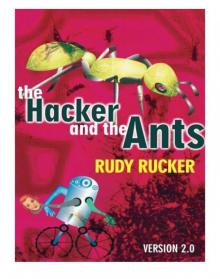 The Hacker and the Ants
The Hacker and the Ants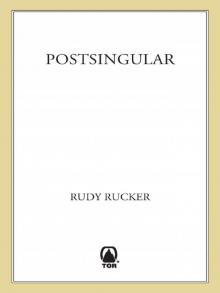 Postsingular
Postsingular Spaceland
Spaceland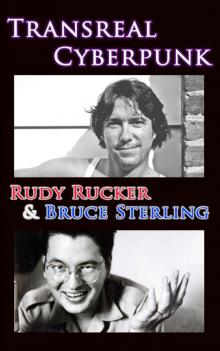 Transreal Cyberpunk
Transreal Cyberpunk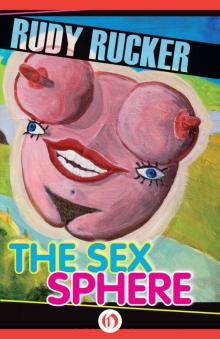 Sex Sphere
Sex Sphere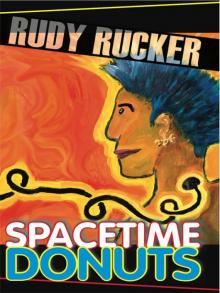 Spacetime Donuts
Spacetime Donuts Freeware
Freeware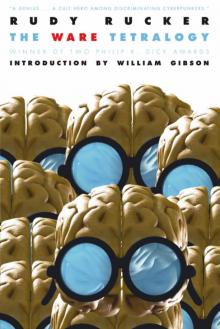 The Ware Tetralogy
The Ware Tetralogy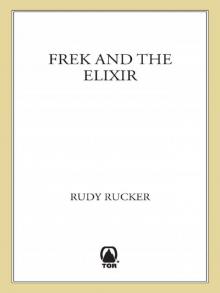 Frek and the Elixir
Frek and the Elixir Junk DNA
Junk DNA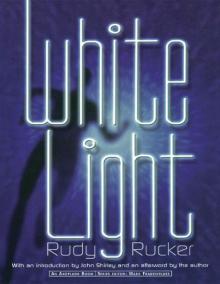 White Light (Axoplasm Books)
White Light (Axoplasm Books) Nested Scrolls
Nested Scrolls Inside Out
Inside Out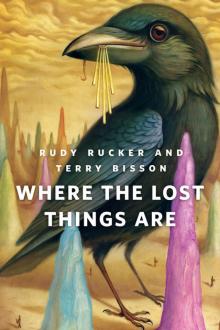 Where the Lost Things Are
Where the Lost Things Are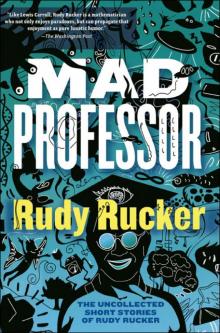 Mad Professor
Mad Professor As Above, So Below
As Above, So Below Realware
Realware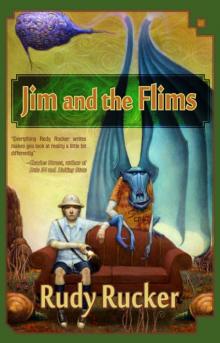 Jim and the Flims
Jim and the Flims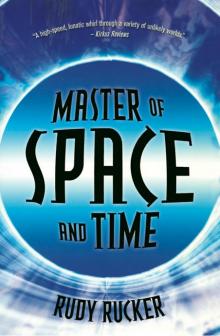 Master of Space and Time
Master of Space and Time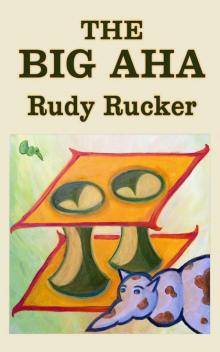 The Big Aha
The Big Aha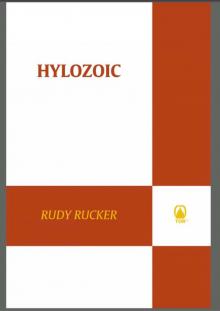 Hylozoic
Hylozoic